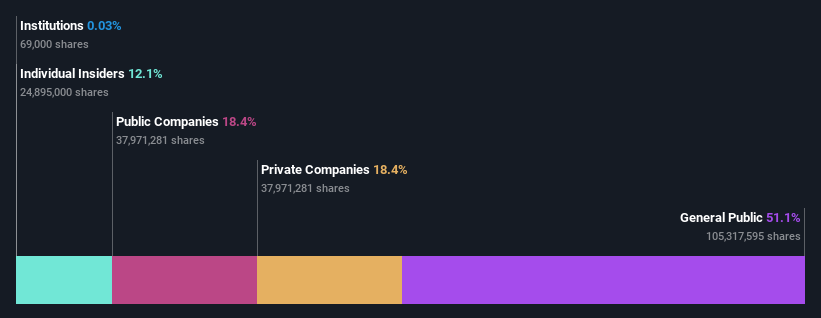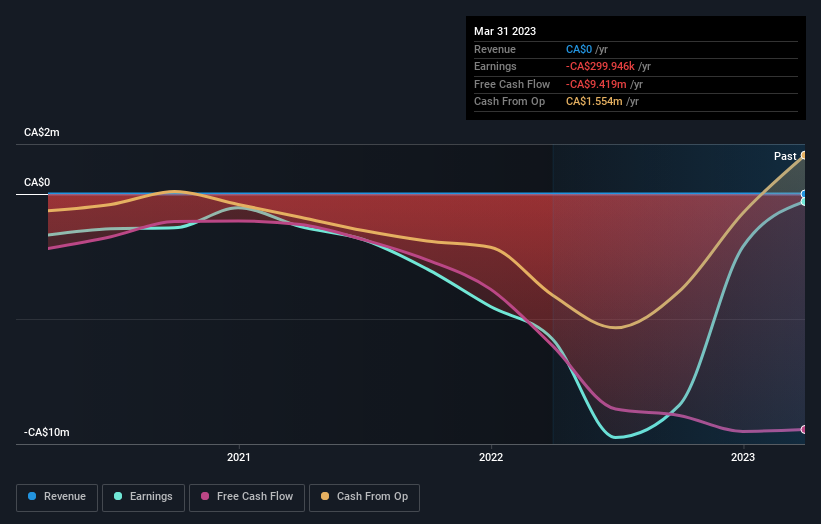Lithium Chile Inc.'s (CVE:LITH) top owners are individual investors with 51% stake, while 18% is held by public companies
Key Insights
The considerable ownership by individual investors in Lithium Chile indicates that they collectively have a greater say in management and business strategy
The top 11 shareholders own 49% of the company
A look at the shareholders of Lithium Chile Inc. (CVE:LITH) can tell us which group is most powerful. The group holding the most number of shares in the company, around 51% to be precise, is individual investors. In other words, the group stands to gain the most (or lose the most) from their investment into the company.
And public companies on the other hand have a 18% ownership in the company.
Let's take a closer look to see what the different types of shareholders can tell us about Lithium Chile.
Check out our latest analysis for Lithium Chile
What Does The Lack Of Institutional Ownership Tell Us About Lithium Chile?
Institutional investors often avoid companies that are too small, too illiquid or too risky for their tastes. But it's unusual to see larger companies without any institutional investors.
There could be various reasons why no institutions own shares in a company. Typically, small, newly listed companies don't attract much attention from fund managers, because it would not be possible for large fund managers to build a meaningful position in the company. Alternatively, there might be something about the company that has kept institutional investors away. Institutional investors may not find the historic growth of the business impressive, or there might be other factors at play. You can see the past revenue performance of Lithium Chile, for yourself, below.
Lithium Chile is not owned by hedge funds. Gator Capital Ltd. is currently the company's largest shareholder with 18% of shares outstanding. For context, the second largest shareholder holds about 18% of the shares outstanding, followed by an ownership of 4.7% by the third-largest shareholder. Albert Kroontje, who is the third-largest shareholder, also happens to hold the title of Chairman of the Board. In addition, we found that Steven Cochrane, the CEO has 1.6% of the shares allocated to their name.
Our studies suggest that the top 11 shareholders collectively control less than half of the company's shares, meaning that the company's shares are widely disseminated and there is no dominant shareholder.
While it makes sense to study institutional ownership data for a company, it also makes sense to study analyst sentiments to know which way the wind is blowing. Our information suggests that there isn't any analyst coverage of the stock, so it is probably little known.
Insider Ownership Of Lithium Chile
While the precise definition of an insider can be subjective, almost everyone considers board members to be insiders. Company management run the business, but the CEO will answer to the board, even if he or she is a member of it.
I generally consider insider ownership to be a good thing. However, on some occasions it makes it more difficult for other shareholders to hold the board accountable for decisions.
Our most recent data indicates that insiders own a reasonable proportion of Lithium Chile Inc.. It has a market capitalization of just CA$155m, and insiders have CA$19m worth of shares in their own names. It is great to see insiders so invested in the business. It might be worth checking if those insiders have been buying recently.
General Public Ownership
The general public, who are usually individual investors, hold a substantial 51% stake in Lithium Chile, suggesting it is a fairly popular stock. This level of ownership gives investors from the wider public some power to sway key policy decisions such as board composition, executive compensation, and the dividend payout ratio.
Private Company Ownership
Our data indicates that Private Companies hold 18%, of the company's shares. Private companies may be related parties. Sometimes insiders have an interest in a public company through a holding in a private company, rather than in their own capacity as an individual. While it's hard to draw any broad stroke conclusions, it is worth noting as an area for further research.
Public Company Ownership
We can see that public companies hold 18% of the Lithium Chile shares on issue. We can't be certain but it is quite possible this is a strategic stake. The businesses may be similar, or work together.
Next Steps:
I find it very interesting to look at who exactly owns a company. But to truly gain insight, we need to consider other information, too. Like risks, for instance. Every company has them, and we've spotted 3 warning signs for Lithium Chile (of which 2 don't sit too well with us!) you should know about.
Of course this may not be the best stock to buy. Therefore, you may wish to see our free collection of interesting prospects boasting favorable financials.
NB: Figures in this article are calculated using data from the last twelve months, which refer to the 12-month period ending on the last date of the month the financial statement is dated. This may not be consistent with full year annual report figures.
Have feedback on this article? Concerned about the content? Get in touch with us directly. Alternatively, email editorial-team (at) simplywallst.com.
This article by Simply Wall St is general in nature. We provide commentary based on historical data and analyst forecasts only using an unbiased methodology and our articles are not intended to be financial advice. It does not constitute a recommendation to buy or sell any stock, and does not take account of your objectives, or your financial situation. We aim to bring you long-term focused analysis driven by fundamental data. Note that our analysis may not factor in the latest price-sensitive company announcements or qualitative material. Simply Wall St has no position in any stocks mentioned.

 Yahoo Finance
Yahoo Finance 

